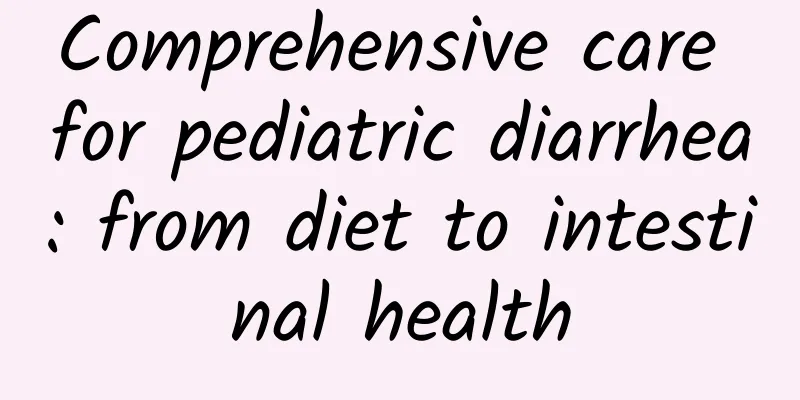Comprehensive care for pediatric diarrhea: from diet to intestinal health

|
Author: Li Lin Chinese People's Liberation Army Air Force 986th Hospital Reviewer: Zhang Ying, deputy chief physician of the 986th Air Force Hospital of the Chinese People's Liberation Army As children grow up, diarrhea is a common problem that often troubles parents. Proper care not only helps children recover quickly, but also effectively prevents complications. Today, we will talk with you about the core knowledge of scientific care during pediatric diarrhea to help parents better understand and deal with this problem. 1. What causes diarrhea in children? What are the symptoms? Diarrhea in children may be caused by a variety of reasons, including but not limited to bacterial and viral infections, unclean food, indigestion, allergic reactions and adverse reactions to certain drugs. Common symptoms of diarrhea include watery stools, abdominal pain, fever, etc. These symptoms not only affect children's daily life, but may also lead to serious consequences such as dehydration. 2. How should children be cared for during diarrhea? 1. Replenish water and electrolytes in time When a child has diarrhea, a large amount of water and electrolytes (such as sodium and potassium) will be lost from the body, which can easily lead to dehydration. Mild cases may cause thirst, dry skin, decreased urine output and other symptoms, while severe cases may be life-threatening. Therefore, it is crucial to replenish water and electrolytes for dehydrated children in a timely manner. If the child is only mildly dehydrated, parents can give the child light salt water or professional electrolyte supplements to maintain the body's water and electrolyte balance; if the child's dehydration symptoms are severe, they should seek medical attention in a timely manner. Figure 1 Copyright image, no permission to reprint 2. Adjust your diet During diarrhea, the child's intestinal function is impaired and the digestion and absorption capacity decreases. Therefore, dietary adjustment is particularly important. It is recommended to adopt the BRAT diet. BRAT is the acronym of the four English words Bananas, Rice, Applesauce and Toast. These four foods are not only easy to digest, but also provide the necessary nutrients for the intestines and promote intestinal recovery. At the same time, children should avoid eating greasy, spicy and other irritating foods to avoid increasing the burden on the intestines. Figure 2 Copyright image, no permission to reprint (1) Early stage of diarrhea: mainly liquid diet In the early stage of diarrhea, the intestinal function of children is the most fragile. At this time, they should mainly eat liquid food, such as rice soup, porridge, light salt water, etc. These foods are easy to digest and absorb, and will not bring too much burden to the intestines. At the same time, parents should pay attention to the changes in their children's condition and seek medical attention in time if necessary. (2) Mid-stage diarrhea: gradually transition to a semi-liquid diet As the condition improves, the child's intestinal function gradually recovers. At this time, you can gradually transition to a semi-liquid diet, such as soft noodles, soft rice, steamed eggs, etc. These foods can not only provide the child with sufficient nutrition, but also promote further recovery of intestinal function. (3) Late stage of diarrhea: resume normal diet When the child's diarrhea symptoms completely disappear and the child is in good spirits, he or she can gradually resume a normal diet. However, parents still need to pay attention to controlling the child's food intake to prevent the child from overeating or eating too much raw or cold food to avoid causing diarrhea again. 3. How to maintain and promote children’s intestinal health? Diarrhea not only affects the child's physical health, but may also cause a certain degree of damage to the intestines. Therefore, after the child's body recovers, parents should pay attention to maintaining and promoting the child's intestinal health. Specific measures include the following aspects. 1. Maintain good personal hygiene Washing hands frequently and keeping food clean are important measures to prevent diarrhea. Parents should teach their children to develop good personal hygiene habits, such as washing hands before and after meals, and not eating unclean food. Figure 3 Copyright image, no permission to reprint 2. Reasonable diet and balanced nutrition A reasonable diet is the basis for maintaining intestinal health. Parents should ensure that their children consume enough protein, carbohydrates, fat, vitamins and inorganic salts to meet the needs of their physical growth and development. 3. Exercise appropriately to improve your physical fitness Appropriate exercise can promote intestinal peristalsis and enhance intestinal function. Parents can encourage their children to do more physical exercise to improve their physical fitness and immunity. Although pediatric diarrhea is common, we can help children overcome this problem through proper care and reasonable diet management. During the care process, parents should pay close attention to changes in their children's condition, replenish water and electrolytes for their children in a timely manner, adjust their diet structure, and urge their children to maintain good personal hygiene. At the same time, paying attention to the maintenance and promotion of intestinal health is also an important measure to prevent diarrhea from happening again. In short, for parents, children's diarrhea is not a "small" matter, and it cannot be taken lightly! |
<<: Headaches, which may be caused by medication overuse
Recommend
When is the best time to take the emergency contraceptive pill?
Contraceptive pills are drugs that people take af...
What are the clinical manifestations of cervical cysts?
Women should know some of the symptoms of cervica...
Best menopause period
As we all know, when women reach a certain age, t...
Hitwise: More than 50% of adult Internet users in the United States regularly use Facebook
In the United States, more than 50% of adult Inte...
Which department should I go to for breast pain?
Hospitals are divided into many departments, each...
What causes poor uterine contraction?
Under normal circumstances, a woman's uterus ...
New evidence that milk causes cancer? Don’t panic, this study should be interpreted like this
gossip "Studies have shown that drinking mil...
Is sex good during menstruation?
Many people may have big doubts about whether it ...
What to do if your menstrual flow is light at 42
Generally speaking, when women reach the age of 4...
What is the reason for itchy breasts?
Some female friends sometimes find that their bre...
What are the ways to get rid of uterine cold?
If female friends often eat cold food in their da...
Will taking short-acting contraceptive pills make you fat?
What are the adverse effects of taking short-term...
[Medical Q&A] My baby doesn’t have a cold, but his throat is hoarse. Why is that?
Author: Li Hongbin, deputy chief physician, Beiji...
Is it good to discharge rotten flesh during menstruation?
If the patient discharges something like rotten m...









